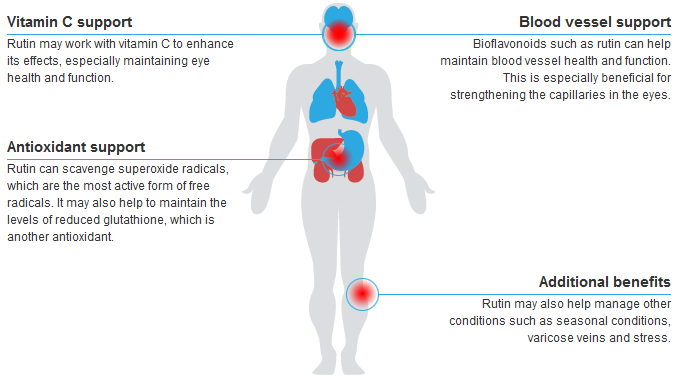Rutin, a valuable supplement for those with varicose veins, hemorrhoids, chronic venous insufficiency, or spider veins, supports circulatory health by strengthening blood vessels, providing antioxidant protection, and enhancing the effects of vitamin C, while also offering potential benefits for managing seasonal conditions and stress.
 Rutin is a plant pigment known scientifically as a flavonoid. It is also known by several specific scientific names such as rutoside, sophorin and quercetin-3-O-rutinoside. Rutin is named after Ruta graveolens, commonly known as rue, which is a plant that contains high levels of rutin. Rutin is chemically described as the glycoside between disaccharide rutinose and quercetin, another flavonoid.
Rutin is a plant pigment known scientifically as a flavonoid. It is also known by several specific scientific names such as rutoside, sophorin and quercetin-3-O-rutinoside. Rutin is named after Ruta graveolens, commonly known as rue, which is a plant that contains high levels of rutin. Rutin is chemically described as the glycoside between disaccharide rutinose and quercetin, another flavonoid.
Rutin is also found in many other plants such as members of the Fagopyrum genera. F. tataricum, commonly known as Tartary buckwheat, is particularly high in rutin. Dry Tartary buckwheat seeds contain up to 1.7 percent rutin. By comparison, the seeds of common buckwheat, known scientifically as Fagopyrum esculentum, only contain 0.01 percent rutin by dry weight. Rutin is also present in citrus fruits such as oranges, lemons, limes and grapefruit.
The ability to bind iron ions is one of the most important biochemical actions of rutin in humans. This action prevents iron ions from forming free radicals by binding with hydrogen peroxide. Free radicals are highly reactive ions that can cause various types of cellular damage. Rutin can also inhibit the production of vascular endothelial growth factor in the laboratory. The most significant benefits of rutin in dietary supplements involve blood vessel health.
The support of blood vessel health is the most common reason for taking rutin. Additional health benefits of rutin include its general antioxidant properties and support for vitamin C.
Rutin may work with vitamin C to enhance its effects, especially maintaining eye health and function.
Rutin can scavenge superoxide radicals, which are the most active form of free radicals. It may also help to maintain the levels of reduced glutathione, which is another antioxidant.
Bioflavonoids such as rutin can help maintain blood vessel health and function. This is especially beneficial for strengthening the capillaries in the eyes.
Rutin may also help manage other conditions such as seasonal conditions, varicose veins and stress.

Most of the signs that you may benefit from rutin involve the circulatory system, especially the veins. Varicose veins in the legs and hemorrhoids are the strongest indication that rutin can help you. Additional conditions that may mean you need rutin include chronic venous insufficiency, in which the veins have difficulty in returning blood to the heart. You may also benefit from rutin if you have spider veins.
Rutoside, sophorin, quercetin-3-O-rutinoside
Shipping calculated at checkout
